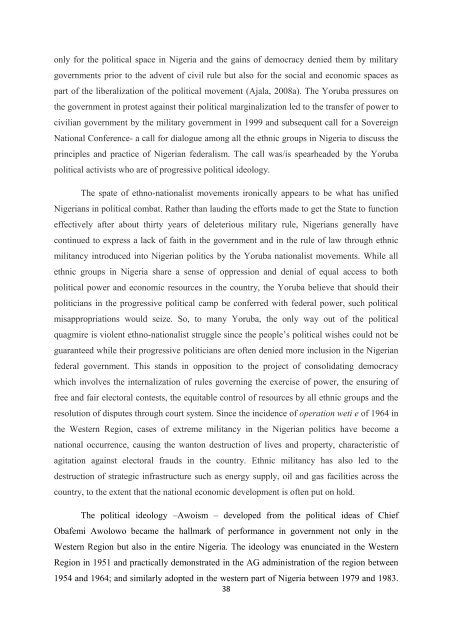The Yoruba Nationalist Movements, Ethnic Politics and Violence: A ...
The Yoruba Nationalist Movements, Ethnic Politics and Violence: A ...
The Yoruba Nationalist Movements, Ethnic Politics and Violence: A ...
You also want an ePaper? Increase the reach of your titles
YUMPU automatically turns print PDFs into web optimized ePapers that Google loves.
only for the political space in Nigeria <strong>and</strong> the gains of democracy denied them by military<br />
governments prior to the advent of civil rule but also for the social <strong>and</strong> economic spaces as<br />
part of the liberalization of the political movement (Ajala, 2008a). <strong>The</strong> <strong>Yoruba</strong> pressures on<br />
the government in protest against their political marginalization led to the transfer of power to<br />
civilian government by the military government in 1999 <strong>and</strong> subsequent call for a Sovereign<br />
National Conference- a call for dialogue among all the ethnic groups in Nigeria to discuss the<br />
principles <strong>and</strong> practice of Nigerian federalism. <strong>The</strong> call was/is spearheaded by the <strong>Yoruba</strong><br />
political activists who are of progressive political ideology.<br />
<strong>The</strong> spate of ethno-nationalist movements ironically appears to be what has unified<br />
Nigerians in political combat. Rather than lauding the efforts made to get the State to function<br />
effectively after about thirty years of deleterious military rule, Nigerians generally have<br />
continued to express a lack of faith in the government <strong>and</strong> in the rule of law through ethnic<br />
militancy introduced into Nigerian politics by the <strong>Yoruba</strong> nationalist movements. While all<br />
ethnic groups in Nigeria share a sense of oppression <strong>and</strong> denial of equal access to both<br />
political power <strong>and</strong> economic resources in the country, the <strong>Yoruba</strong> believe that should their<br />
politicians in the progressive political camp be conferred with federal power, such political<br />
misappropriations would seize. So, to many <strong>Yoruba</strong>, the only way out of the political<br />
quagmire is violent ethno-nationalist struggle since the people’s political wishes could not be<br />
guaranteed while their progressive politicians are often denied more inclusion in the Nigerian<br />
federal government. This st<strong>and</strong>s in opposition to the project of consolidating democracy<br />
which involves the internalization of rules governing the exercise of power, the ensuring of<br />
free <strong>and</strong> fair electoral contests, the equitable control of resources by all ethnic groups <strong>and</strong> the<br />
resolution of disputes through court system. Since the incidence of operation weti e of 1964 in<br />
the Western Region, cases of extreme militancy in the Nigerian politics have become a<br />
national occurrence, causing the wanton destruction of lives <strong>and</strong> property, characteristic of<br />
agitation against electoral frauds in the country. <strong>Ethnic</strong> militancy has also led to the<br />
destruction of strategic infrastructure such as energy supply, oil <strong>and</strong> gas facilities across the<br />
country, to the extent that the national economic development is often put on hold.<br />
<strong>The</strong> political ideology –Awoism – developed from the political ideas of Chief<br />
Obafemi Awolowo became the hallmark of performance in government not only in the<br />
Western Region but also in the entire Nigeria. <strong>The</strong> ideology was enunciated in the Western<br />
Region in 1951 <strong>and</strong> practically demonstrated in the AG administration of the region between<br />
1954 <strong>and</strong> 1964; <strong>and</strong> similarly adopted in the western part of Nigeria between 1979 <strong>and</strong> 1983.<br />
38

















